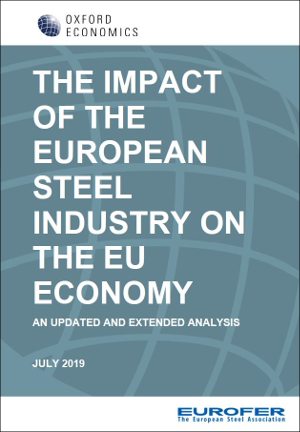Ungated Post | 11 Jul 2019
The impact of the European steel industry on the EU economy

Oxford Economics’ analysis demonstrates the importance of the EU steel industry, which supports an extensive supply chain across the continent, and facilitates highly-valued work in key customer sectors – including metal product, machinery and motor vehicle manufacturing, as well as construction.
This study updated previous work for Eurofer, and showed that, in 2017, the EU steel industry’s own (‘direct’) contribution to EU-wide GVA was €25 billion, associated with some 328,000 workers and €10 billion in tax revenues.Taking into account ‘indirect’ (supply chain) and ‘induced’ (wage-funded expenditure) effects too, the industry’s total contribution to EU GVA in that year was £148 billion – more than the GVA of the Berlin region – supporting 2.6 million jobs and €60 billion of tax.
This year’s analysis also looked at the economic impact of four key customer sectors, namely manufacture of metal products, mechanical machinery, and motor vehicles, plus construction. Excluding impacts on and via each other, and on and via the steel sector, the total combined impact of these sectors, through their direct, indirect and induced channels, was found to be €3.4 trillion in terms of EU-wide GVA, supporting 62 million jobs and €1.35 trillion of tax revenues. The share of these impacts arguably ‘enabled by’ the use of EU-produced steel, taking into account the share of those inputs in a wider ‘steel and alternative inputs’ grouping, was put at close to a third.
Click here to download the full report now
Our economic consulting team are world leaders in quantitative economic analysis, working with clients around the globe and across sectors to build models, forecast markets and evaluate interventions using state-of-the art techniques.
Lead consultants on this project were:
Oxford Economics’ team is expert at applying advanced economic tools that provide valuable insights into today’s most pressing business, financial,and policy issues.
To find out more about our capabilities, contact:
EMEA
Pete Collings
+44 (0)203 910 8078
Email
Americas
Hamilton Galloway
+1 (646) 503 3068
Email
Asia
Christie Tang
+852 3974 8841
Email
Related Services

Post
The Economic Footprint of JLR in the UK
This report examines the economic footprint of JLR in the United Kingdom in 2024. The analysis is conducted both at the national level, as well as on the West Midlands and North West regions, where JLR’s main facilities are located.
Find Out More
Post
Airbnb’s Economic Contribution to APAC in 2024: GDP, Jobs, and Regional Impact
Airbnb's platform connects hosts across Asia Pacific (APAC) with travellers from around the world. Oxford Economics was commissioned by Airbnb to quantify its economic footprint in 10 APAC markets in 2024.
Find Out More
Post
Economic Insights: Airbnb’s Contribution Through the Lens of Oxford Economics
Oxford Economics Australia delivered a tailored economic impact assessment for Airbnb, including GDP contribution modelling, job creation analytics, guest‑spend segmentation, and regional tourism dispersion insights to underpin Airbnb’s stakeholder communications and strategic growth initiatives.
Find Out More